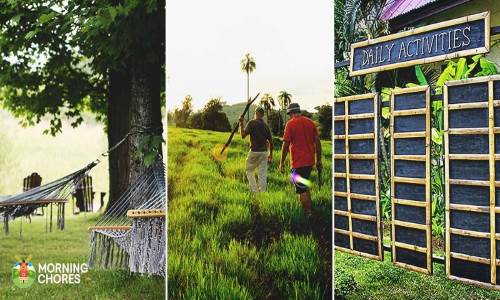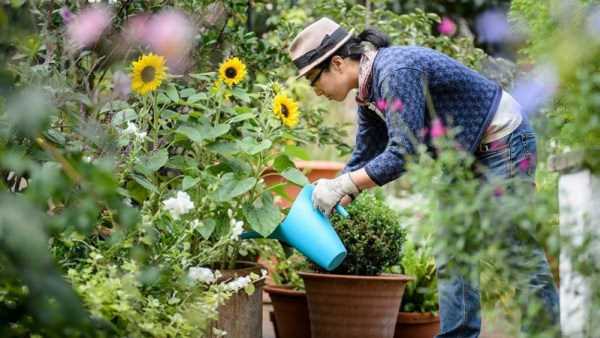Do you run a small or large homestead? Are you striving to be self-sufficient? Are you also struggling to keep your head above water in this season of life?
Well, you aren’t alone. In fact, I’ve felt like I was drowning myself lately. Which is why I felt inspired to write this post to help get the overwhelmed homesteader back on track.

Whatever your goal for this journey may be, we all go through difficult periods in our lives where life seems to be steam rolling us.
But you don’t have to give up on your homesteading or self-sufficient journey just because life gets tough.
How to Get the Overwhelmed Homesteader Back on Track
So here is what I’ve been doing to cope with a difficult season in life and get my homestead caught back up:
1. Just Breathe
A little background on my current situation is my family and I sold our previous homestead and moved to a new, larger one. The house buying transition has been anything but smooth.
Thankfully, we are finally in our new home though.
But there is so much to be done. There is unpacking, organizing, building animal structures, building barns, fencing, planting a garden, the list goes on and on. It feels as though we are so behind.
Then I have to remind myself that Rome wasn’t built in a day so neither will my new homestead. I just have to simply breathe.
So I don’t know what your current situation is, but the best advice I have for you at this very time is: take a deep breath, because one way or another it will all get done.
2. Collect Your Thoughts

Lately, I have had a million thoughts swirling around in my head. I remind myself daily of the chicken run that needs to be built, the garden that needs planting, the shelving I need to add to our new kitchen, and so much more.
But the problem is, the more I think and fret, the less I get done.
So when I realize I’m practicing this behavior, I collect those thoughts and put them on paper. This allows me to get them out of my head and actually see what needs to be done.
For instance, my to-do list for today was:
- Add sides to the goat shed
- Plant the garden
- Build the chicken run
- Write this article
- Catch up on laundry
Then I’ll wake up tomorrow and pick a few other items from those thoughts I wrote down so I can have another productive day.
And yes, I’m happy to say that my goats now have sides to their shelter so they can get a little extra shade, my chickens are happily pecking in their run, laundry is done, and our garden is planted.
So for me, the method of getting things out of my head and where I can visibly see them really helps me turn my fretting into action.
3. Priorities, Priorities

My husband and I both have the habit of freaking ourselves out by talking about everything that needs to be done. We found ourselves doing this yesterday, actually.
So we were standing out where our garden is now and talking about everything that needed to be done as we just looked around in a big circle surveying our property.
Finally, we got our garden tilled and knew that we were ready to plant today. I told him that just talking about everything, was making things worse. I was too tired to make my list last night, but I planned to do it first thing in the morning when I woke up.
So I did. When I woke up I started a list of everything that needed to be done inside and outside of our new home.
Then I began prioritizing them. Finishing the goats’ shed and giving our chickens a run was super important because I knew the goats were getting hot out on pasture and our chickens had been cooped up for longer than I wanted them to be.
Next, I looked at the few boxes I have left to unpack. So I decided that adding shelving would be our next priority and organizational project, so I could get all of the boxes completely out of the house.
Then I just progressed down the list of things I needed to do by numbering them by their importance.
Finally, I made a new list that had these items listed by priority ranking. Then I went on with my day and was very productive.
So you can do the same thing. When you look around your homestead and start to panic because of all that needs to be done, write your list, and then prioritize it. When there is organization to the madness, it no longer feels like chaos.
4. Work on Your List

After I had my list made and ranked by priority, I got to work. I try not to pick more than five things from my master list to do in a day. That way I don’t become overwhelmed, and I’m less likely to feel defeated because usually, five things should be a realistic goal for any day.
Granted, this can change based on your health, schedule, or the size of the projects on your list. If you feel like five is too much, then aim for 2-3 projects a day.
If you get through with those, then move on to more tasks. Anything you get done is an accomplishment. Just don’t load yourself down because then you’ll feel defeated and want to quit. Those feelings just start the cycle all over again.
So set reasonable goals for your day.
However, I must say this, be sure that you work efficiently. We all have little distractions throughout our day.
For me, it was my email. My phone would constantly ding with emails all day long, and I’d check them because I never knew if it was something important or just an advertisement.
Finally, I realized how much time I was losing by that distraction, that I disabled email notifications on my phone, and I now have set times throughout my day that I allow myself to check my email.
So be aware of whatever distractions you have in your life. If it is your email or social media, then disable the notifications. If it is something else, then try to find a way around it. Just try to work as efficiently as possible.
Now, I know that there are some parents out there that homestead. We are in the same boat and sometimes kids make homesteading a little more challenging.
But that’s okay. Do all you can to get your children involved around the homestead. If you move a little slower getting through your to-do list because you have little ones in tow, I say cut the to-do’s down and enjoy where you are at, because those days of going slow because little legs can’t keep up, won’t last forever.
Then you’ll be where I am, where those little legs are now longer than your own, and I find myself the one running to keep up with them!
5. Take a Break When You Need To
We are homesteaders, not superheroes. We can only do so much in one day. If I know I’ve given the weeks all that I can, and I’m making progress but am not fully caught up yet, sometimes I take a break.
You heard me. I give myself a rest because you can only burn the candle at both ends for so long. If you don’t take care of yourself, then you’ll really have problems.
So for instance, we moved into our home last Monday. I had almost the whole house unpacked in that week. We had built the basic animal structures and fencing the week before.
Then our oldest son graduated high school this past weekend which meant our Saturday was crammed full of family gatherings at our new home and graduation.
Needless to say, I was exhausted on Sunday. I tried to push myself forward all morning, but after lunch, I cleaned up and laid down on the couch to nap.
And I slept—for 3 hours! Clearly, I needed the rest.
Sometimes we have to give our bodies a rest. Then we get up and go again. Which is exactly what I did. After I woke up, we tilled the garden and got it ready to plant today—which we did.
So if you have been pushing yourself as hard as you can, give yourself a day (or even an afternoon) to get a little rest, then go at it again with a fresh outlook.
6. Depend on Your Neighbors

Homesteading is all about family and community. When we fall behind, you can’t just sweep in and get it all done all by yourself. Not without seriously burning ourselves out.
So if you have friends, neighbors, or loved ones close by, then ask them for help. It’s okay.
Then when they need your help, you can be there for them. That is how it is supposed to work.
Honestly, if it wasn’t for our family, we wouldn’t be able to homestead. We are a family of 5, and we homestead as a unit. I don’t do everything nor does my husband. Our boys get out there and work right alongside us to learn and to help.
And we have some of the best family moments working and building this dream together.
So don’t feel like a failure if you need to ask for help. Working together is a great way to get things caught up around your homestead, and it is also a great opportunity to build and strengthen relationships in the process.
7. Don’t Give Up
Homesteading isn’t easy. Raising your own food and being self-sustained is a very gratifying lifestyle, but it requires a lot of work.
Regardless of how large of a homesteader you are, anything extra you do to be more self-sufficient is still one extra thing you have to keep up with.
But remember, in most circumstances, you can get right side up in your chores list again. Then you can keep pushing forward with your dream.
So, if you feel like me – the overwhelmed homesteader, unless your circumstances are drastically changing, I urge you to avoid frustration and don’t throw in the towel. Instead, keep your head up, keep pushing forward, and give yourself grace.
Well, I hope my list has helped you regain a little focus in your homesteading situation. Though we try to live a slower lifestyle in homesteading, it doesn’t always happen. Life happens instead.
But with a little organization, help, and prioritizing you should (hopefully) be back on track in no time. I know I’m hoping the same for my homestead.
Now, I want to know, what do you do when life happens, and you feel like you have a million things to do around your homestead and don’t even know where to begin? I know our community could glean from any input because this is something I think we all face at some point in time on our homesteading journey.
We love hearing from you and appreciate your input. So leave us your thoughts in the space provided below.
Source : morningchores.com
Want to be as self-sufficient as possible? Want to master all the lost skills our grandfathers had? Then you really need this amazing step-by-step guide. It is called The Lost Ways and it contains all the knowledge of our forefathers.
Here’s just a glimpse of what you’ll find in The Lost Ways:
From Ruff Simons, an old west history expert and former deputy, you’ll learn the techniques and methods used by the wise sheriffs from the frontiers to defend an entire village despite being outnumbered and outgunned by gangs of robbers and bandits, and how you can use their wisdom to defend your home against looters when you’ll be surrounded.
Native American ERIK BAINBRIDGE – who took part in the reconstruction of the native village of Kule Loklo in California, will show you how Native Americans build the subterranean roundhouse, an underground house that today will serve you as a storm shelter, a perfectly camouflaged hideout, or a bunker. It can easily shelter three to four families, so how will you feel if, when all hell breaks loose, you’ll be able to call all your loved ones and offer them guidance and shelter? Besides that, the subterranean roundhouse makes an awesome root cellar where you can keep all your food and water reserves year-round.
From Shannon Azares you’ll learn how sailors from the XVII century preserved water in their ships for months on end, even years and how you can use this method to preserve clean water for your family cost-free.
Mike Searson – who is a Firearm and Old West history expert – will show you what to do when there is no more ammo to be had, how people who wandered the West managed to hunt eight deer with six bullets, and why their supply of ammo never ran out. Remember the panic buying in the first half of 2013? That was nothing compared to what’s going to precede the collapse.
From Susan Morrow, an ex-science teacher and chemist, you’ll master “The Art of Poultice.” She says, “If you really explore the ingredients from which our forefathers made poultices, you’ll be totally surprised by the similarities with modern medicines.” Well…how would you feel in a crisis to be the only one from the group knowledgeable about this lost skill? When there are no more antibiotics, people will turn to you to save their ill children’s lives.
And believe it or not, this is not all…
Table Of Contents:
Making Your Own Beverages: Beer to Stronger Stuff
Ginger Beer: Making Soda the Old Fashioned Way
How North American Indians and Early Pioneers Made Pemmican
Spycraft: Military Correspondence During The 1700’s to 1900’s
Wild West Guns for SHTF and a Guide to Rolling Your Own Ammo
How Our Forefathers Built Their Sawmills, Grain Mills,and Stamping Mills
How Our Ancestors Made Herbal Poultice to Heal Their Wounds
What Our Ancestors Were Foraging For? or How to Wildcraft Your Table
How Our Ancestors Navigated Without Using a GPS System
How Our Forefathers Made Knives
How Our Forefathers Made Snow shoes for Survival
How North California Native Americans Built Their Semi-subterranean Roundhouses
Our Ancestors’Guide to Root Cellars
Good Old Fashioned Cooking on an Open Flame
Learning from Our Ancestors How to Preserve Water
Learning from Our Ancestors How to Take Care of Our Hygiene When There Isn’t Anything to Buy
How and Why I Prefer to Make Soap with Modern Ingredients
Temporarily Installing a Wood-Burning Stove during Emergencies
Making Traditional and Survival Bark Bread…….
Trapping in Winter for Beaver and Muskrat Just like Our Forefathers Did
How to Make a Smokehouse and Smoke Fish
Survival Lessons From The Donner Party
Get your paperback copy HERE
CHECK OUR survival and prepping solutions
If you found this article useful, please like our Facebook page and stay up to date with the latest articles.
WHAT TO READ NEXT:
HOW TO MAKE YOUR OWN BACON (STEP BY STEP GUIDE)
A RETURN TO THE OLD PATHS: HOW TO MAKE PEMMICAN LIKE THE NATIVE AMERICANS
20 LOST RECIPES FROM THE PIONEERS: WHAT THEY COOKED ON THEIR JOURNEY WESTWARD
SEVEN CLASSIC GREAT DEPRESSION ERA RECIPES GRANDMA USED TO MAKE
POTTED MEAT: A LOST SKILL OF LONG TERM MEAT STORAGE
BACK TO BASICS: HOW TO MAKE AND PRESERVE LARD
THE BEST WAY TO STOCKPILE VEGETABLES OFF-GRID
OLD FASHIONED PRESERVING-GRANDPA’S RECIPE FOR CURED SMOKED HAM
HOW TO MAKE GUNPOWDER THE OLD FASHIONED WAY
SURVIVAL HERBAL RECIPES FROM OUR ANCESTORS
HOW TO PRESERVE MEAT FOR SURVIVAL LIKE OUR GRANDFATHERS
OTHER USEFUL RESOURCES:
The 3 Pioneer Survival Lessons We Should Learn
The Most Effective Home Defense Strategies
Old School Hacks for Off-Grid Living
The Medical Emergency Crash Course
